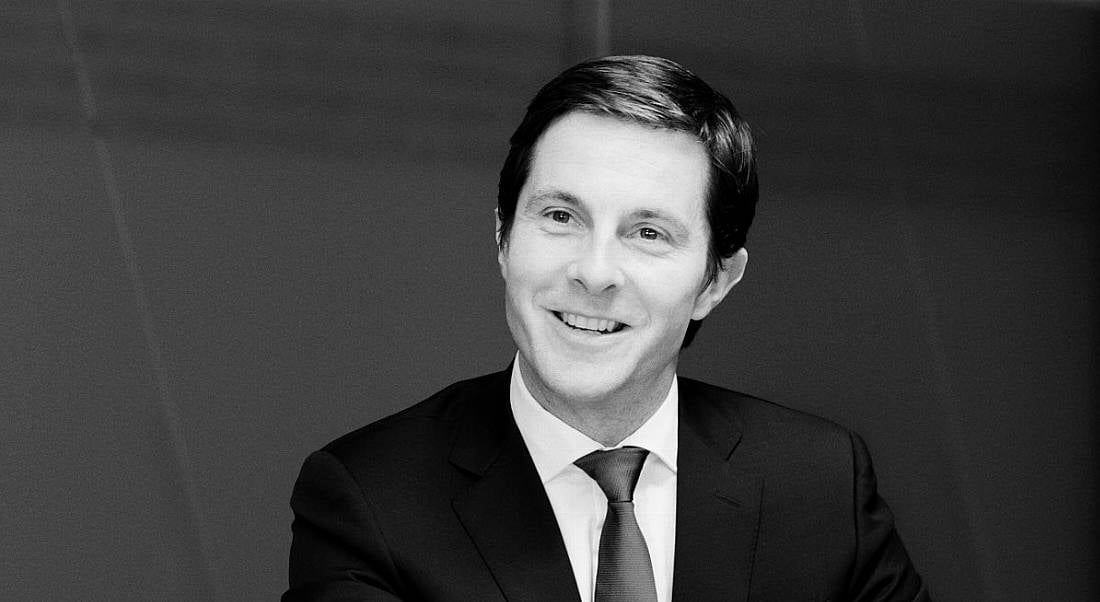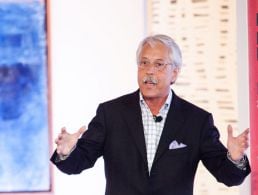EY’s Colin Ryan shares his predictions for the future of work and how it will affect both employees and organisations.
As we look to 2019 and beyond, we still want to know more about the future of work and what it will mean for the workforce.
Colin Ryan is the financial services advisory lead in EY. He has extensive experience designing and delivering complex strategic change and business transformation initiatives for his clients. Here, he shares his views on the future of work and the trends he expects.
What challenges and opportunities face the workplace and workforce of the future?
The workforce and workplaces of today are increasingly ‘fluid’ in nature and are likely to face a higher degree of constant change in coming years. By 2020, up to 7.1m jobs will disappear as a result of disruptive technologies. Gartner forecasted that within 12 years’ time, 80pc of financial firms will either go out of business or be rendered irrelevant by new competition, changing customer behaviour and advancements in technology.
People starting into their professional careers today will experience more change in their working life than any other generation in recent history. Technology and automation is advancing such that some recent reports estimate that more than 30pc of work tasks in traditional organisations will be capable of being performed by robotic automation (and related technologies) within three years.
At the same time, new industries are appearing overnight and established ones are falling away, or being disrupted, almost as quickly. These dynamics present profound changes to how we think and talk about careers, jobs and roles in the coming years.
What key trends do you foresee in relation to intra-team behaviour, management-employee interactions or other workplace dynamics?
As our work activities change, the contract or ‘promise’ between employer and employee will need to evolve. The traditional approach of recruiting an individual and retaining them for 10 or more years with a promise of future reward and opportunity is no longer viable. Employees have different work expectations and are looking for a greater sense of purpose.
Progressive organisations have already recognised that the need for honest and timely conversations with their employees, quick feedback loops, and constant dialogue on performance and career development are key to engaging and retaining today’s best talent.
How will the workplace change as the baby boomers and Generation X age out of the workforce, and it becomes millennial-driven?
In the digital era, businesses need to collectively manage the differing expectations of a multigenerational workforce. Generation X, baby boomers and veterans are retiring later, Generation Z is entering the workforce, and millennials will soon dominate the workforce (75pc by 2025).
The talent of the future will need to be self-driven and able to operate in a fast-paced, virtual environment where they are given greater freedom to innovate. They will also need to be highly collaborative and externally oriented.
The best way I can illustrate this is in my approach to educating my own children. As a parent, I am very focused on helping them develop exploration skills and curiosity as I don’t believe there will be such things as single careers and roles when they enter the workforce. I believe that by encouraging them to try out many avenues of interest and ask questions until they understand, they will be more prepared for the demands that will be placed on them in their future lives.
What part will diversity and inclusion play in the make-up of the workforce of the future?
I feel this debate should have passed at this stage. We all know at this point that the most successful organisations are just that because they manage to tap into the best and collective talent of their workforce. I see this as ‘table stakes’ in the coming years, but know many organisations are still catching up.
From a broader perspective, we also know that employees and wider stakeholders feel more strongly about these topics than ever before. Businesses that embrace diversity and inclusion will not only achieve better outcomes, but will also attract better talent, generate greater customer loyalty and more investment.
Work-life balance is arguably central to job satisfaction. How can it be better achieved?
I don’t particularly like the phrase ‘work-life balance’ – it creates the perception that people sacrifice half their day in order to live! The idea of pursuing meaningful activities seems to align closer with job satisfaction and is something we see in EY. Pursuing meaningful activities might be the ability to drop your kids to school in the morning and it might be delivering a world-class solution to a client. The point is that these activities can change from day to day and from person to person.
We can achieve better job satisfaction through greater flexibility to take on meaningful activities, and form better links between individual and organisational objectives. This means providing opportunities to work in areas that people really care about while also providing the flexibility that enables them to pursue passions in their personal lives.
We’ve seen immense increases in salary, particularly in tech. Do you think salaries in your sector will trend upwards or will we start to see other benefits coming to the fore?
Salaries and cost of living are of course intrinsically linked. In the Irish market, I think we will continue to see wage inflation in high-skilled and knowledge-oriented roles for the coming few years, in line with our economic outlook.
There is a particular dynamic in the Irish market (particularly in Dublin) where people starting out in their careers are struggling to stretch their salaries to keep up with life events – moving out of home, renting, buying a first property, starting a family etc. It’s a particular feature of our generation.
Traditionally, of course, pay and promotion were seen as the most important factors, but this is changing with the emergence of millennials into the workforce. Priorities are changing. Employees are no longer seeking a nine-to-five environment, but instead focus on the importance of flexibility and wellbeing in their working lives.
Millennials entering the workforce are increasingly interested in maintaining healthier lifestyles, which is impacting job satisfaction and employee productivity – hence, other benefits such as flexible working arrangements, gym membership, healthcare and wellbeing programmes get greater emphasis.
We’re currently deep in the world of data. What part will data play in developing the future of work?
Clearly, data is the lifeblood of the modern organisation. The exponential growth in structured and unstructured data, and the ability to extract value from it, are driving what is often now called the data revolution. Given this quick pace of innovation in technologies, being able to develop the right talent and select the right tools to enable insight and generate value is a complex challenge.
In our most recent research, we found that two-thirds of businesses in Ireland plan to recruit more staff in the area of data analytics in the next year, yet the vast majority of organisations (79pc) say they are experiencing difficulties in recruiting people with the requisite skills. Hence, attracting and developing the right people and skills will be the real differentiator when it comes to extracting the value from these new data sources.
We’re looking at a more automated future, as AI and bots become more sophisticated. How do you think this will affect roles in your sector?
AI and robotics offer fantastic opportunities to businesses and to people. The individual underlying technologies in current-day robotics are not new but it’s the combination of all the features into a single, mature package that works with existing systems, that makes the offerings really exciting.
Few kids dream of working in data entry when they grow up, so hopefully robotics can help us remove some of the monotony and repetitiveness from the workplace. Not only can robotics reduce manual operations costs by between 25pc and 40pc or more, but it does this while improving service and compliance.
Clearly, there will more demand for people with technical skills to create AI and robotics solutions – but that’s not all. As services become more automated, opportunities will emerge for companies to offer more personalised, human advice and services. In effect, AI and robotics will enable the workforce of the future to focus on more personal and more technically creative activities.
What are the sectors of the future? Where do you believe we will we be seeing job growth and development?
From a personal perspective, I am very excited about how the financial services industry will change over the years to come. Major technology and regulatory shifts are colliding at the moment, which means that we could see a vastly different financial services ecosystem in the not-too-distant future. This could mean new offerings, new players or entrance from outside players. All of this is great for customers and employees alike as this change will accelerate growth and adoption of new technologies, offering huge opportunities for those in the industry.
What will companies need to do to attract and support the best talent?
Competition for talent is exacerbated by shortages in segments of the labour market – in particular, science, technology, engineering and maths (STEM). This is likely to have deteriorated by 2020 as banks, insurers, fintechs and technology companies continue to source digital talent. A recent CIPD Labour Market Survey found that 24pc of respondents within financial services say their companies have hard-to-fill vacancies – the highest among all industries.
Therefore, offering opportunities to develop careers in spaces that people care about will continue to be a major differentiator when attracting top talent.
Employees whose sense of personal fulfilment closely aligns to that of their employer have been shown to outperform their peers. Similarly, purpose-driven employees also report higher engagement scores, are likely to stay with a company longer and recommend the organisation to others. Inevitably, purpose-driven companies are more successful in acquiring and retaining customers and employees.
How do companies need to change right now to be ready for the future of work you have envisioned here?
Something we know will be true for all companies is that their employees will increasingly care about what they do and want a greater desire of identity. Employees have different work expectations and are looking for a greater sense of purpose. Developing and maintaining a truly purpose-driven organisation will be critical for companies to attract customers, retain staff and ultimately succeed in the future.
A recent EY and Harvard Business Review survey highlighted that although 90pc of executives understand the importance of purpose, less than half say it influences their strategic and operational decision-making.
I think it starts with open and honest reflection on your company and objectives, turning to honest, bilateral dialogue with your employees, and starting from a position of trust and respect for the individual.




